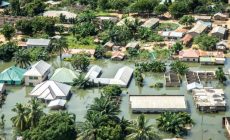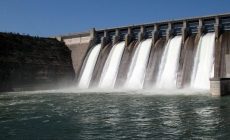Pay $100m debt in 2 weeks or face shut down of gas supply – N-Gas warns VRA
- Posted on
- Comment
 N-Gas, the main supplier of lean gas to Ghana’s Volta River Authority (VRA) through the West African Gas Pipeline Company (WAPCo)
N-Gas, the main supplier of lean gas to Ghana’s Volta River Authority (VRA) through the West African Gas Pipeline Company (WAPCo)
, has given Ghana a two-week ultimatum to clear its outstanding debt of over $100 million or gas supply will be shut down.
The two-week deadline expires this week.
The debt jeopardises WAPCo’s very existence as a company.
The debt covers gas supplied to VRA and the cost of supply and transportation of the gas from Nigeria to Ghana by WAPCo.
Gas supply from Nigeria averages 20 million standard cubic feet of gas per day, which the Sunon Asogli Power Plant in Tema uses to generate over 100 megawatts of electricity.
In the event that supply is cut, it will impact power supply negatively and intensify power cuts.
Reliable sources have told The Finder that because Ghana failed to deliver on a timetable to settle all the outstanding debt by end of February 2016, N-Gas is bent on receiving full payment, and anything short of that will lead to a cut in gas supply.
Consequently, government has called an emergency meeting this week with WAPCo officials to deliberate on the matter and see how best to avert the shutdown.
The sources will, however, not disclose the date for the meeting this week.
October 2015 threat
In October 2015, N-Gas threatened to cut gas supply to VRA over $181 million debt.
Government quickly paid $9.5 million out of the $181 million debt for gas supplied from August 2014 to October 2015.
This means the balance to be paid is $171.5 million.
Ghana and N-Gas agreed on a timetable to clear the outstanding debt of $171.5 million by ending of February 2016, as well as paying in full for fresh gas supplied.
The $171.5 million was to be paid in three tranches from November 2015 to ending of February 2016.
As of July 2015, VRA owed banks to the tune of over $1.3 billion, and it will be very difficult for VRA to secure a loan from any bank in Ghana to pay its debt to N-Gas.
This means the Government of Ghana, which is the 100% owner of VRA, will have to look for money to bailout VRA to ensure that N-Gas does not cut supply to Ghana.
Ghana gets about 25% of power through gas from Nigeria, which flows through the pipeline via Benin and Togo.
VRA’s power generation problems are a sign of the budgetary stress facing Ghana, a country that is following an International Monetary Fund (IMF) programme to restore fiscal balance.
VRA stopped paying its bills in August 2014. Prior to that, VRA had been borrowing money from Ghanaian banks at high interest rates to fund its payments, resulting in over $1.3 billion debt owed the banks.
The power crisis stems from a fall in supply from hydro sources, government’s underpayment to the Electricity Company of Ghana, residents’ illegal consumption and tariffs too low for VRA to recoup its costs.
N-Gas is a company jointly-owned by Nigerian National Petroleum Corporation (NNPC), Shell Petroleum Development Company (SPDC) and Chevron Nigeria Limited.
The company, which is jointly owned by Shell, Chevron and the NNPC, buys gas from oil companies in Nigeria and transports the gas to its customers in Benin, Togo and Ghana through the $1 billion West African Gas Pipeline (WAGP), which is operated by the West African Gas Pipeline Company (WAPCo).
The International Project Agreement (IPA) – signed in May 2003 by WAPCo and the governments of Benin, Ghana, Nigeria and Togo, with the secretariat of the Economic Community of West African States (ECOWAS) as witness – provides that N-Gas be allocated a space in the pipeline that could transport up to 200 million standard cubic feet of gas per day.
WAPCo is owned by Chevron West African Gas Pipeline Ltd (36.9%); Nigerian National Petroleum Corporation (24.9%); Shell Overseas Holdings Limited (17.9%); Takoradi Power Company Limited (16.3%), Societe Togolaise de Gaz (2%) and Societe BenGaz S.A. (2%).
By Elvis DARKO, Accra










 (Selorm) |
(Selorm) |  (Nana Kwesi)
(Nana Kwesi)